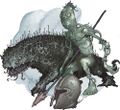Vegepygmy: Difference between revisions
1d4chan>Nubnuber (Added images) |
1d4chan>Nubnuber No edit summary |
||
| Line 1: | Line 1: | ||
[[File:Vegepygmy 5e.jpg|right|300px|thumb|A 5e Vegepygmy with a Thorny.]] | [[File:Vegepygmy 5e.jpg|right|300px|thumb|A 5e Vegepygmy with a Thorny.]] | ||
'''Vegepygmies''', also known as '''Mold Men''', are an obscure race of monsters from [[Dungeons & Dragons]] who owe their existence to the venerable 1st edition module [[Expedition to the Barrier Peaks]]. As their name implies, they are short humanoid plant creatures, whose bristling "loincloths" and "topknots" of lichen-like growths makes them look something like an old caricature of a savage pygmy. A vegepygmy is created when a typical D&D humanoid is consumed by the parasitic alien fungus known as Russet Mold, producing a primitive humanoid from the resultant mass of fungus that dwells in tribe-like groups, hunting for flesh to sustain itself with. | '''Vegepygmies''', also known as '''Mold Men''', are an obscure race of monsters from [[Dungeons & Dragons]] who owe their existence to the venerable 1st edition module [[Expedition to the Barrier Peaks]]. As their name implies, they are short humanoid plant creatures, whose bristling "loincloths" and "topknots" of lichen-like growths makes them look something like an old caricature of a savage [[Pygmies|pygmy]]. A vegepygmy is created when a typical D&D humanoid is consumed by the parasitic alien fungus known as Russet Mold, producing a primitive humanoid from the resultant mass of fungus that dwells in tribe-like groups, hunting for flesh to sustain itself with. | ||
Like many other obscure and forgotten monsters from the first two editions, especially their module brethren the [[Froghemoth]] and the Wolf-In-Sheep's Clothing, Vegepygmies received an update in [[Pathfinder]], which took special care to give them some new depth by expanding on their personalities with traits like religiously making weapons from the corpses of their humanoid "progenitors", their worship of russet mold as a "mother-god", and the fact that they can be peaceful and reasonable creatures - until they need to add new members to the tribe by exposing outsiders to the russet mold. | Like many other obscure and forgotten monsters from the first two editions, especially their module brethren the [[Froghemoth]] and the Wolf-In-Sheep's Clothing, Vegepygmies received an update in [[Pathfinder]], which took special care to give them some new depth by expanding on their personalities with traits like religiously making weapons from the corpses of their humanoid "progenitors", their worship of russet mold as a "mother-god", and the fact that they can be peaceful and reasonable creatures - until they need to add new members to the tribe by exposing outsiders to the russet mold. | ||
Revision as of 21:43, 3 November 2020

Vegepygmies, also known as Mold Men, are an obscure race of monsters from Dungeons & Dragons who owe their existence to the venerable 1st edition module Expedition to the Barrier Peaks. As their name implies, they are short humanoid plant creatures, whose bristling "loincloths" and "topknots" of lichen-like growths makes them look something like an old caricature of a savage pygmy. A vegepygmy is created when a typical D&D humanoid is consumed by the parasitic alien fungus known as Russet Mold, producing a primitive humanoid from the resultant mass of fungus that dwells in tribe-like groups, hunting for flesh to sustain itself with.
Like many other obscure and forgotten monsters from the first two editions, especially their module brethren the Froghemoth and the Wolf-In-Sheep's Clothing, Vegepygmies received an update in Pathfinder, which took special care to give them some new depth by expanding on their personalities with traits like religiously making weapons from the corpses of their humanoid "progenitors", their worship of russet mold as a "mother-god", and the fact that they can be peaceful and reasonable creatures - until they need to add new members to the tribe by exposing outsiders to the russet mold.
Gallery
-
1e
-
2e
-
A Vegepygmy Adventurer (Dragon #265)
-
5e
-
Pathfinder




